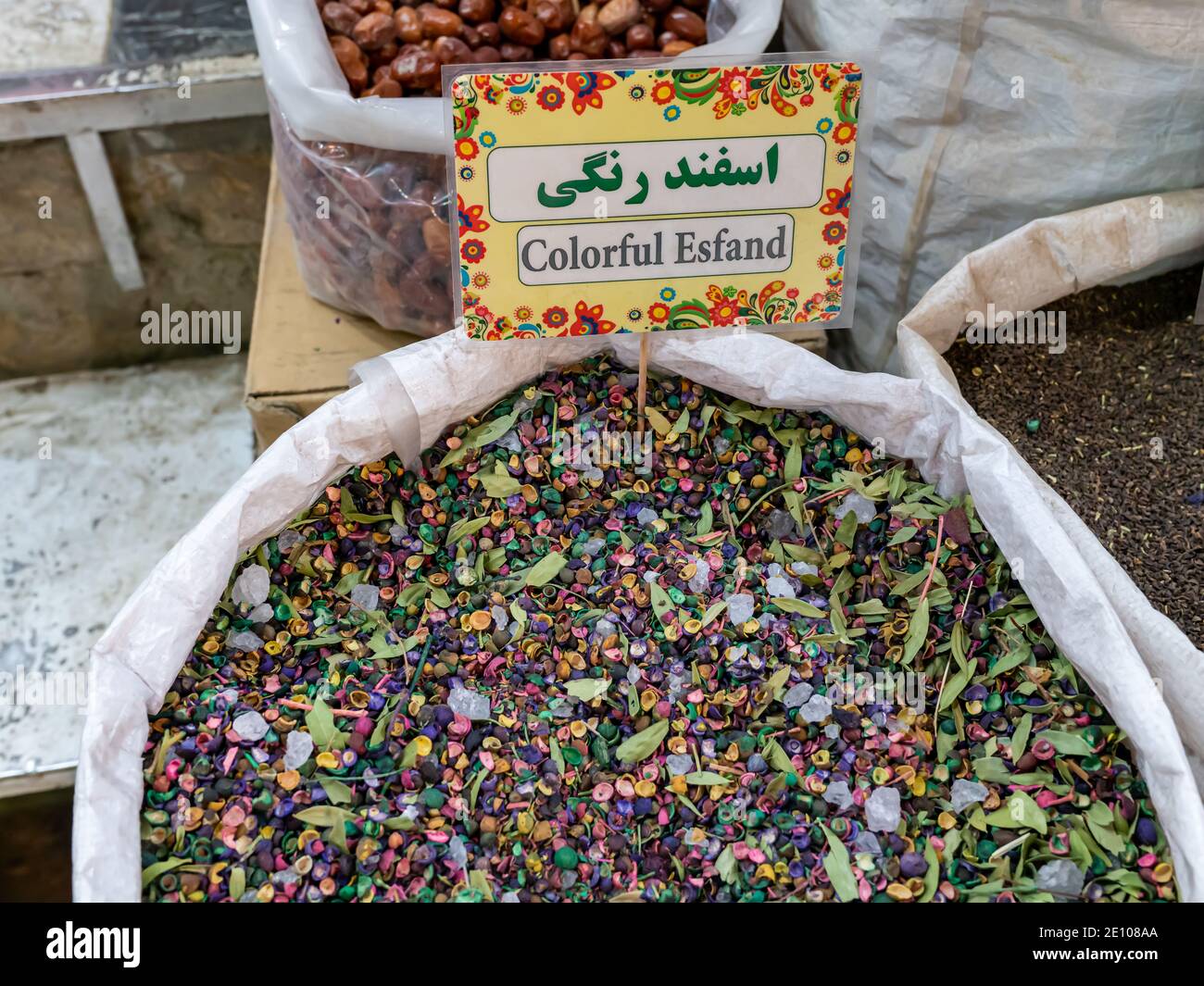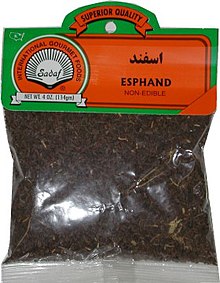I would say that Persian Basil is a cross between Thai Basil and Lemon Basil. Esfand is called Syrian Rue in English.
Esfand The Magical Gaurdian Herb Persian Food Tour
Wild Rue Seedscalled Esphand in Persian is an aromatic seed commonly used to create incense and is burned with other seeds and roots to create different aromas.

Esfand persian herb. Wild rue a common weed found in Persia Central Asia and the adjacent areas for the the plants name in other Iranian languages see Flattery and Schwartz p. The seeds of Esfand are analgesic and will reduce stomachache and refrigerant. Esfand Epand or Esphand has a strong presence in every Persian house and cultural rituals.
With cilantro you can either remove all leaves like I do or just cut off the bottom part of the stem that is thicker and tougher. Iranians believe that this dried herb has the magical power to stave off harm and avert the negative vibes. Esfand is basically these dried herbs that every Persian household has them.
Burning Esfand is a supernatural protector against negativity and bad luck. Described verbatim by informant. Esfand is basically these dried herbs that every Persian household has them.
If you are going to use it for burning you might want to add a bit of Golpar Heracleum persicumPersian Hogweed as well. Rue called in Old Iranian svanta spand Modern Farsi Esfand was a well known auspicious plant among the ancient Aryans. Wild Rue seeds or Esphand its Persian term is mostly used in Iran India and some African countries.
Persian Basket is an Online Persian Grocery Store where our goal is to make it quick and easy to buy all your favorite PersianIranian ingredients online. Aspand is the common Persian Dari Farsi name for Peganum harmala a perennial shrubby herb in the Zygophyllaceae or Caltrop family. While the seeds pop and the smoke is circled around the head a short verse is recited.
The name is also transliterated as Espand Esfand and Esphand and the plant itself is also given the regional common name Harmal or Harmala in Pakistan and India. Wild Rue Seeds-Esphand is an aromatic seed commonly used to create incense and is burned with other seeds and roots to create different aromas. In Iran Esfand is used to fight against the evil eye.
Do the same thing with the mint removing the top part leaving it intact and then removing the individual leaves. Throughout the area of the former Persian empire an herb seed called ASPAND ESFAND or HARMAL is burned on charcoal to rid children of the Evil Eye and to bring blessings after one has performed a sorrowful rite such as attending a funeral. If you have any questions or concerns please dont hesitate to call us.
Another charming use of golpar seed pods is that you can often find it mixed with esfand seeds اسپند in the ancient Persian tradition of burning esfand اسپند دود دادن to avert the evil eye. We ship anywhere in the US or Canada and our products usually ship the same day you order them so dont wait. It has a pleasant aroma when they burn it.
Greek authors refer to it as persaia botane Flattery and Schwartz pp. Esfand was well known among the ancient Indo-Iranians. Peganum harmala commonly called wild rue Syrian rue African rue esfand or espand or harmel among other similar pronunciations and spellings is a perennial herbaceous plant with a woody underground root-stock of the family Nitrariaceae usually growing in saline soils in temperate desert and Mediterranean regions.
Esfand and sage burning practices in Persian culture cleanse houses bodies and objects that may be occupied by evil spirits spirits of the dead or may be afflicted by the evil eye. It can be purchased online or at your local specialty sacredreligious herb shop or most Persian stores. It plays a great role in both cooking and as incense among the Iranian Zoroastrians.
Most Iranians have especial pots for burning Esphand. The esfands extract is beneficial for palsy tremor and epilepsy muscles jerk alleviation of backache sciatic phlegmatic kidney and womb. And that my friends is the tale of a Persian spice called golpar.
Described verbatim by informant. Esfand and sage burning practices in Persian culture cleanse houses bodies and objects that may be occupied by evil spirits spirits of the dead or may be afflicted by the evil eye. This is a tradition that has been passed down through generations from the days of Zoroastrianism.
It has many beneficial properties besides being burnt. ESFAND sepand sepanj espanj Proto-Ir. Wild Rue Seeds-Esphand is an aromatic seed commonly used to create incense and is burned with other seeds and roots to create different aromas.
And say um a. People burn it solely or blend it with some other seeds such as Boswellia.
Esfand The Evil Eye My Persian Kitchen
Esfand The Magical Gaurdian Herb Persian Food Tour
Esfand The Evil Eye My Persian Kitchen
 Esphand Esfand Espand Buy Online At Persian Basket
Esphand Esfand Espand Buy Online At Persian Basket
 Traditional Healing Harmala Peganum Syrian Rue Esfand Swana Ancestral Hub
Traditional Healing Harmala Peganum Syrian Rue Esfand Swana Ancestral Hub
Zoroastrian Purification Ceremonies
 Sadaf Wild Rue Seeds Esphand 4 Oz Sadaf Com
Sadaf Wild Rue Seeds Esphand 4 Oz Sadaf Com
Esfand The Evil Eye My Persian Kitchen
 Aspand Espand Esfand Esphand Against The Evil Eye In Zoroastrian Magic
Aspand Espand Esfand Esphand Against The Evil Eye In Zoroastrian Magic
 Pile Esfand Herb Sold Image Photo Free Trial Bigstock
Pile Esfand Herb Sold Image Photo Free Trial Bigstock
Esfand The Evil Eye My Persian Kitchen
 Coloured Esfand Peganum Harmala 50g Herbalistics
Coloured Esfand Peganum Harmala 50g Herbalistics
Esfand The Evil Eye My Persian Kitchen
 Esfand Wild Rue Seeds Is An Aromatic Seed Commonly Used To Create Incense Herbs In Tabriz Grand Bazaar Is One Of The Oldest Bazaars In The Middle Ea Stock Photo Alamy
Esfand Wild Rue Seeds Is An Aromatic Seed Commonly Used To Create Incense Herbs In Tabriz Grand Bazaar Is One Of The Oldest Bazaars In The Middle Ea Stock Photo Alamy

 Colorful Esfand Sold In A Traditional Iranian Market Persian Writing Translates For Colorful Esfand Stock Photo Alamy
Colorful Esfand Sold In A Traditional Iranian Market Persian Writing Translates For Colorful Esfand Stock Photo Alamy

Everything About Peganum Harmala Smoking In 2 Iran


No comments:
Post a Comment